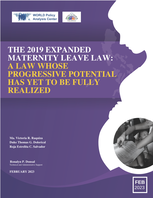Media ReleasesFeaturesNews |
FeaturesTHE 2019 EXPANDED MATERNITY LEAVE LAW
A study entitled “The 2019 Expanded Maternity Leave Law (EMLL): A Law Whose Progressive Potential Has Yet to Be Fully Realized" was undertaken by Social Watch Philippines (SWP) in collaboration with the WORLD Policy Analysis Center (WORLD). This research aimed to understand the initial impact of expanding a Philippine social protection program on maternity leave. This study described and analyzed the features and implementation of the 2019 Expanded Maternity Leave Law (EMLL), including the financial costs and administrative capacities of the government and private sector to implement the law. It also reported the strengths, weaknesses, and challenges in implementation, especially its impact on numerous impoverished workers, particularly those in the informal economy. The research also laid recommendations to improve the performance of the EMLL and cover as many female members of the informal sector as possible.
|

